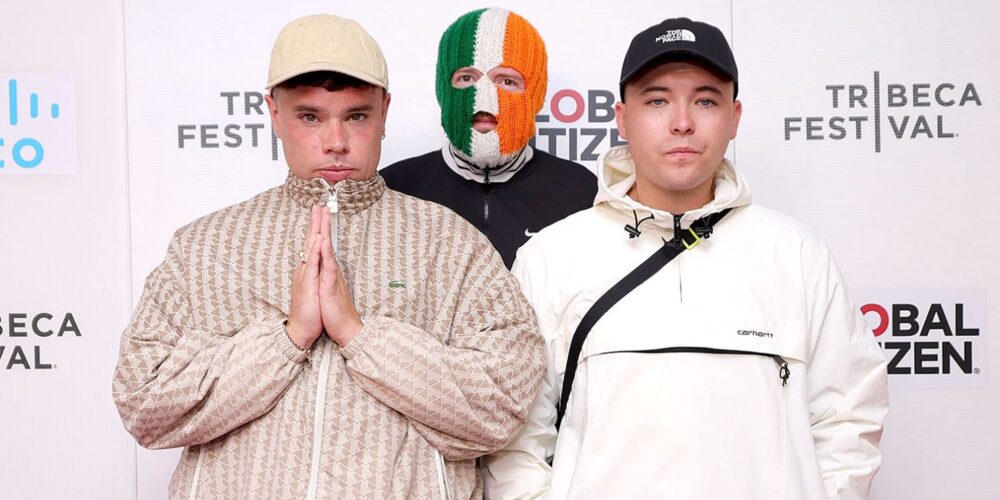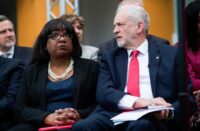In an era of cultural homogenisation and sanitised commercial music, Irish language, punk-rap trio Kneecap stand out as a raw, unapologetic expression of working-class resistance and international solidarity with the oppressed. Their explosive rise to fame is not just a musical phenomenon but a political one—rooted in anti-imperialism, socialist struggle, and the reclamation of Irish identity under capitalist oppression.
Kneecap’s popularity reflects the growing discontent among the working class, particularly in the North of Ireland, where inequality, occupation, sectarianism and class exploitation remain defining features of daily life.
Kneecap’s music channels the justified fury of a generation betrayed by “the peace process” in Ireland: a process that promised prosperity and apple pie, but delivered only increased marginalisation for working-class communities who are worse off by every metric now than they were in 1998.
Their lyrics articulate this rage brilliantly, whether attacking British imperialism (Get Your Brits Out) or exposing the failures of neoliberal capitalism (Better Way to Live). However, as Marxists, we must recognise that anger alone, no matter how potent, cannot dismantle the structures of oppression.
History has shown repeatedly that cultural resistance, while vital, must be coupled with organised working-class politics to achieve revolutionary change. The ruling class can tolerate—and even commodify—rebellious art, so long as it remains disconnected from mass political movements. Kneecap’s radical energy is electrifying, but without ties to organised socialist and republican struggles, it risks being absorbed as mere spectacle.
Kneecap’s globally eye-catching performance at Glastonbury—one of the world’s most high-profile music festivals—was a watershed moment, not just for the group but for Irish radical culture. Their set, delivered partly in Irish and punctuated by anti-imperialist visuals (including burning parliaments and Palestinian flags), was a direct provocation to the British establishment.
The establishment’s reaction was telling. The British state has always sought to depoliticise art, especially when it challenges its legitimacy. Kneecap’s presence at Glastonbury—a festival often criticised for its commercialisation and performative activism—disrupted the illusion of harmless dissent. Their performance wasn’t just entertainment; it was class warfare in real-time. But symbolic challenges alone will not break the power of capitalism and imperialism.
One of Kneecap’s revolutionary acts is their use of An Ghaeilge [the Irish language]. Kneecap rejects the bourgeois appropriation of our native language, instead wielding it as a weapon of proletarian defiance. By rapping in Irish, they reclaim our language from the conservatism of state-sponsored revival efforts and restore its radical potential. The group’s insistence on performing in Irish, even when English would guarantee broader commercial success, is a direct challenge to cultural imperialism and the commodification of identity under capitalism. Yet language, like music, is only a tool. Its revolutionary power depends on who wields it and to what end. The Irish language movement, historically tied to anti-colonial struggle, is and must continue to be connected to the broader fight against capitalism.
The significance of Kneecap’s platform cannot be overstated, but their message must be directed toward building working-class organisation. Imagine if their call to “get your Brits out” were linked not just to cultural expression but to concrete campaigns—tenant unions, workplace organising, or mass mobilisation for Irish reunification under socialist principles. This is where their potential truly lies: not just in voicing discontent, but in helping to organise it.
Kneecap’s organic, working-class appeal is their greatest strength. Unlike corporate-backed artists who sanitize their politics, they remain rooted in the communities they represent. But for their message to translate into material change, it must feed into organised struggle. The energy of their crowds—chanting anti-imperialist slogans, fists raised in solidarity—must be harnessed beyond the mosh pit.
This is not a critique of Kneecap, but a challenge to all of us who are inspired by them. Revolutionary art is essential, but it is not sufficient. The next step is building the structures—the unions, the parties, the mass movements—that can turn cultural resistance into political power.
As the ruling class tightens its grip, artists like Kneecap provide something rare: a voice for the voiceless, a soundtrack for rebellion, and proof that another world is possible. Their success isn’t just measured in streams or sales, but in the growing militancy of a generation waking up to its own power.
Kneecap has given the Irish working class something invaluable: a voice, a rallying cry, and proof that resistance is alive. But as Lenin reminded us, without revolutionary theory and organisation, there can be no revolution. Their music is the spark—now it’s up to the organised working class to fan it into flames. For communists, Kneecap isn’t just a band—they’re comrades in the fight.






